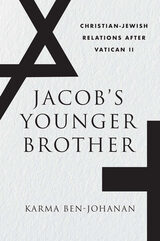5 books by Leap, William
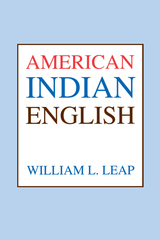
American Indian English
William L Leap
University of Utah Press, 1993
American Indian English documents and examines the diversity of English in American Indian speech communities. It presents a convincing case for the fundamental influence of ancestral Native American languages on respective modern Indian English codes.
A distillation of over twenty years’ experience, William Leap’s pioneering work on the varieties of American Indian English explores the linguistic and sociolinguistic characteristics of language use among Navajo, Hopi, Mojave, Ute, Tsimshian, Kotzebue, Ponca, Chilcotin, Seminole, Cherokee, and other American Indian tribes.
Unlike contemporary studies on schooling, ethnicity, empowerment, and educational failure, American Indian English avoids postmodernist jargon and discourse strategies in favor of direct description and commentary. Data are derived from real-life conditions faced by speakers of Indian English in various English-speaking settings. This practical focus enhances the book’s accessibility to Indian educators and community-based teachers, as well as non-Indian academics.
A distillation of over twenty years’ experience, William Leap’s pioneering work on the varieties of American Indian English explores the linguistic and sociolinguistic characteristics of language use among Navajo, Hopi, Mojave, Ute, Tsimshian, Kotzebue, Ponca, Chilcotin, Seminole, Cherokee, and other American Indian tribes.
Unlike contemporary studies on schooling, ethnicity, empowerment, and educational failure, American Indian English avoids postmodernist jargon and discourse strategies in favor of direct description and commentary. Data are derived from real-life conditions faced by speakers of Indian English in various English-speaking settings. This practical focus enhances the book’s accessibility to Indian educators and community-based teachers, as well as non-Indian academics.
[more]

Out in the Field
Reflections of Lesbian and Gay Anthropologists
Edited by Ellen Lewin and William L. Leap
University of Illinois Press, 1996
"Definitive and well-rounded. . . . Explores how anthropologists
manage issues of identity and sexuality in field research and professional
life. In an era when the field worker's positionality is critical to research
and ethnographic writing, this insightful book has much to say to gay
and straight researchers alike." -- Louise Lamphere, University of
New Mexico
"Addresses sensitive, controversial, and tabooed subjects. . . .
Out in the Field will be read by a variety of audiences, within
and outside of anthropology." -- Jean Jackson, Massachusetts Institute
of Technology
Lesbian and gay anthropologists write candidly in Out in the Field
about their research and personal experiences in conducting fieldwork,
about the ethical and intellectual dilemmas they face in writing about
lesbian or gay populations, and about the impact on their careers of doing
lesbian/gay research.
The first volume in which lesbian and gay anthropologists discuss personal
experiences, Out in the Field offers compelling illustrations of
professional lives both closeted and out to colleagues and fieldwork informants.
It also concerns aligning career goals with personal sexual preferences
and speaks directly to issues of representation and authority currently
being explored throughout the social sciences.
CONTRIBUTORS: Geoffrey Burkhart, Liz Goodman, Delores M. Walters, Walter
L. Williams, Sabine Lang, Ellen Lewin, William L. Leap, Ralph Bolton,
Elizabeth Lapovsky Kennedy, Madeline Davis, Will Roscoe, Esther Newton,
Stephen O. Murray, James Wafer, Kath Weston, Sue-Ellen Jacobs
manage issues of identity and sexuality in field research and professional
life. In an era when the field worker's positionality is critical to research
and ethnographic writing, this insightful book has much to say to gay
and straight researchers alike." -- Louise Lamphere, University of
New Mexico
"Addresses sensitive, controversial, and tabooed subjects. . . .
Out in the Field will be read by a variety of audiences, within
and outside of anthropology." -- Jean Jackson, Massachusetts Institute
of Technology
Lesbian and gay anthropologists write candidly in Out in the Field
about their research and personal experiences in conducting fieldwork,
about the ethical and intellectual dilemmas they face in writing about
lesbian or gay populations, and about the impact on their careers of doing
lesbian/gay research.
The first volume in which lesbian and gay anthropologists discuss personal
experiences, Out in the Field offers compelling illustrations of
professional lives both closeted and out to colleagues and fieldwork informants.
It also concerns aligning career goals with personal sexual preferences
and speaks directly to issues of representation and authority currently
being explored throughout the social sciences.
CONTRIBUTORS: Geoffrey Burkhart, Liz Goodman, Delores M. Walters, Walter
L. Williams, Sabine Lang, Ellen Lewin, William L. Leap, Ralph Bolton,
Elizabeth Lapovsky Kennedy, Madeline Davis, Will Roscoe, Esther Newton,
Stephen O. Murray, James Wafer, Kath Weston, Sue-Ellen Jacobs
[more]
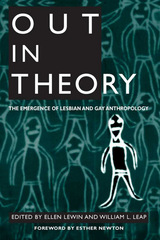
Out in Theory
The Emergence of Lesbian and Gay Anthropology
Edited by Ellen Lewin and William L. Leap
University of Illinois Press, 2002
A companion volume to Out in the Field, a benchmark examination of lesbian and gay experiences in anthropology, Out in Theory presents lesbian and gay anthropology as a distinct specialization and addresses the theoretical issues that define the emerging field.
This compelling collection of essays details the scholarly and personal factors that affected the emergence of lesbian and gay anthropology and speculates on the directions it will take as it continues to grow and diversify. Seeking to legitimize the field's scholarship and address issues in terminology, the essays also define the lesbian and gay anthropology's scope and subject matter and locate factors that separate it from the wider concerns of the profession.
Specific essays track the emergence of lesbian and gay studies in social and cultural anthropology, linguistics, archaeology, and in various areas of anthropological activism. They also consider how feminist anthropology helped define the field and how transgendered experience, queer theory, and race and class studies are promoting new directions of inquiry within lesbian and gay anthropology.
This compelling collection of essays details the scholarly and personal factors that affected the emergence of lesbian and gay anthropology and speculates on the directions it will take as it continues to grow and diversify. Seeking to legitimize the field's scholarship and address issues in terminology, the essays also define the lesbian and gay anthropology's scope and subject matter and locate factors that separate it from the wider concerns of the profession.
Specific essays track the emergence of lesbian and gay studies in social and cultural anthropology, linguistics, archaeology, and in various areas of anthropological activism. They also consider how feminist anthropology helped define the field and how transgendered experience, queer theory, and race and class studies are promoting new directions of inquiry within lesbian and gay anthropology.
[more]
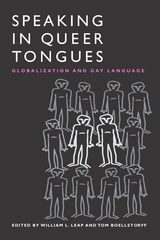
Speaking in Queer Tongues
GLOBALIZATION AND GAY LANGUAGE
Edited by William L. Leap and Tom Boellstorff
University of Illinois Press, 2003
Language is a fundamental tool for shaping identity and community, including the expression (or repression) of sexual desire. Speaking in Queer Tongues investigates the tensions and adaptations that occur when processes of globalization bring one system of gay or lesbian language into contact with another.
Western constructions of gay culture are now circulating widely beyond the boundaries of Western nations due to influences as diverse as Internet communication, global dissemination of entertainment and other media, increased travel and tourism, migration, displacement, and transnational citizenship. The authority claimed by these constructions, and by the linguistic codes embedded in them, is causing them to have a profound impact on public and private expressions of homosexuality in locations as diverse as sub-Saharan Africa, New Zealand, Indonesia and Israel.
Examining a wide range of global cultures, Speaking in Queer Tongues presents essays on topics that include old versus new sexual vocabularies, the rhetoric of gay-oriented magazines and news media, verbal and nonverbalized sexual imagery in poetry and popular culture, and the linguistic consequences of the globalized gay rights movement.
Western constructions of gay culture are now circulating widely beyond the boundaries of Western nations due to influences as diverse as Internet communication, global dissemination of entertainment and other media, increased travel and tourism, migration, displacement, and transnational citizenship. The authority claimed by these constructions, and by the linguistic codes embedded in them, is causing them to have a profound impact on public and private expressions of homosexuality in locations as diverse as sub-Saharan Africa, New Zealand, Indonesia and Israel.
Examining a wide range of global cultures, Speaking in Queer Tongues presents essays on topics that include old versus new sexual vocabularies, the rhetoric of gay-oriented magazines and news media, verbal and nonverbalized sexual imagery in poetry and popular culture, and the linguistic consequences of the globalized gay rights movement.
[more]
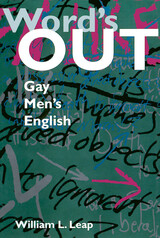
Word’s Out
Gay Men’s English
William Leap
University of Minnesota Press, 1996
Sample Conversation:
Conversation between two men, a salesclerk (S) and a customer (C).
S: Can I help you find something?
C: No thanks, I am just looking. [Pause while customer looks at merchandise]
C: What are you asking for these? [Points to set of grey sweatshirts]
S: Oh. I'm afraid they're not on sale today. But that colored shirt would look nice on you. [Points to a pile of lavender sweatshirts, which are on sale]
C: Yeah, I know. I own a few of them already. [Grins]
S: [Grins back; no verbal comment]
C: Thanks for your help. [C walks off]
The first book-length analysis of the language used by gay men.
Do gay men communicate with each other differently than they do with straight people? If they do, how is "gay men's English" different from "straight English"? In Word's Out, William Leap addresses these questions in an entertaining account that looks at gay men's English as a cultural and a linguistic phenomenon.
Whereas previous studies of "gay language" have centered almost entirely on vocabulary, word history, and folklore, Word's Out focuses on the linguistic practices-cooperation, negotiation, and risk taking-that underlie gay men's conversations, storytelling, verbal dueling, self-description, and construction of outrageous references. Leap "reads" conversations for covert and overt signs of gay men's English, using anecdotes drawn from gay dinner parties, late-night airplane flights, restaurants, department stores, and gourmet shops, and from other all-gay and gay/straight settings. He incorporates material from life-story narratives and other interviews and discussions with gay men, from gay magazines, newspapers, and books, and from events in his own life.
The topics addressed include establishing the gay identities of "suspect gays," recollections of gay childhood, erotic negotiation in health club locker rooms, and gay men's language of AIDS. Leap shows how gay English speakers use language to create gay-centered spaces within public places, to protect themselves when speaking with strangers, and to establish common interests when speaking with "suspect gays," and explores why learning gay English is a critical component in gay men's socialization and entry into gay culture.
Provocative and potentially controversial, Word's Out provides fascinating insight into the politics of gay experience by exploring the connections between language and daily experience in gay men's lives.
"Word's Out is the first comprehensive linguistic ethnography of the North American gay male speech community. Word's Out is a significant contribution to language and gender research in general and to lavender linguistics in particular." --American Speech
"The book is a superb example of gay studies at its best and as it should be. It deals with real people and uses theory only to clarify points, not to cloud issues or to display the author's cleverness." --Lambda Book Report
"This work explores important insights into the politics of gay experience." --The Reader's Review
"How gay men's English is different from straight men's English is one of the topics studied in this fascinating look at language and orientation." --Feminist Bookstore News
"This book presents engaging analysis of a large number of instances of 'Gay English,' including banter at parties and gyms, poignant memories of trying to understand adolescent feelings of difference, several excerpts from fiction, a pair of 1980s popular songs, toilet graffiti, 1987 responses to two sex ads, interview responses, and some folk semantics." --Anthropological Linguistics
William L. Leap is professor of anthropology at American University in Washington, D.C. His recent articles on gay English have appeared in New York Folklore, High School Journal, and in his edited collection Beyond the Lavender Lexicon (1995).
[more]
READERS
Browse our collection.
PUBLISHERS
See BiblioVault's publisher services.
STUDENT SERVICES
Files for college accessibility offices.
UChicago Accessibility Resources
home | accessibility | search | about | contact us
BiblioVault ® 2001 - 2024
The University of Chicago Press



